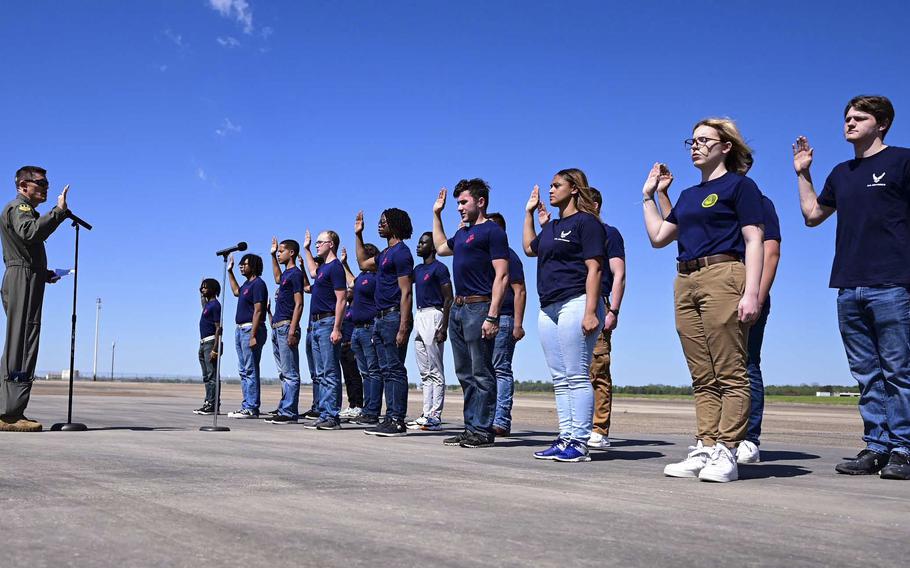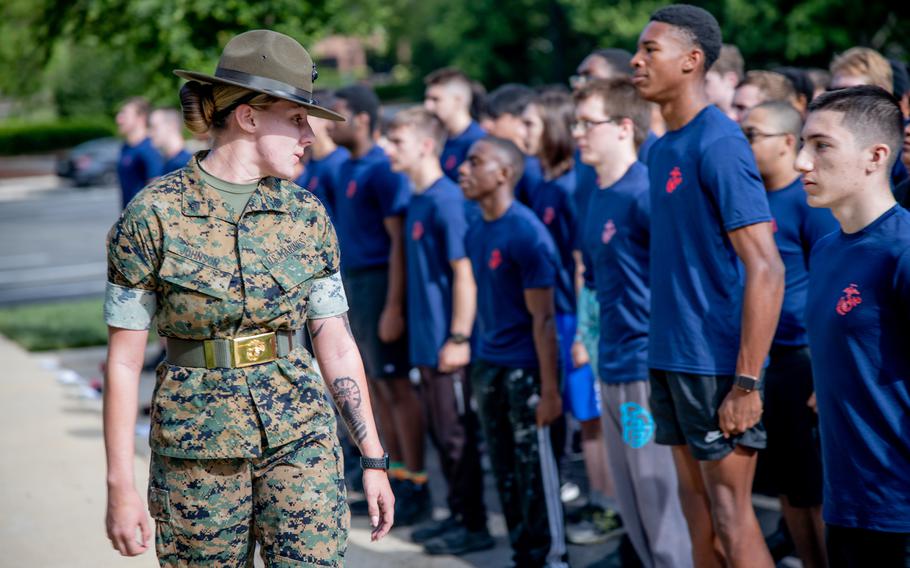
Gen. Laura Richardson, commander of U.S. Southern Command, administers the oath of enlistment to 16 new Army recruits in Northglenn, Colo., on April 27, 2023. An alumna of Northglenn High School, Richardson was on hand to tell students about the benefits of military service. A new Senate bill would allow recruiters greater access to high schools and colleges. (Michael Hunnisett/U.S. Army)
Legislation drafted by a group of U.S. senators aims to alleviate the military’s ongoing woes in attracting new members by allowing recruiters greater access to high schools and colleges.
Introduced Wednesday, the Military Service Promotion Act would allow branches of the service to obtain college student dropout data, require the Pentagon to examine ways to prep possible recruits better for physical fitness and aptitude tests and force schools to let recruiters attend career fairs and similar events.
While high schools already must provide access to military recruiters under current law, the new bill also would obligate them to respond to recruiter requests for access within 60 days.
The bill comes amid concerns that the military’s all-volunteer force may be reaching its breaking point.

Air Force Col. Scott Weyermuller swears in new recruits at the Defenders of Liberty Air Show at Barksdale Air Force Base, La., on March 25, 2023. New Senate legislation seeks to address shortfalls in military recruitment. ( William Pugh/U.S. Air Force)
The Army fell short of its most recent recruiting goal of 60,000 by more than 25%, signing up fewer than 45,000 new soldiers in 2022.
Other services barely met their targets. In March, Air Force Secretary Frank Kendall said the service was struggling to enlist new airmen and likely would miss its active-duty, reserve and Air National Guard recruiting goals this year.
“Our military is facing the largest recruitment crisis in 50 years, which has real impacts on our national security,” Sen. Mitt Romney, R-Utah, one of the bill’s sponsors, said in a statement Wednesday.
While the bill is intended to boost enlistee numbers by making more students aware of the opportunities provided by the military, the extent to which it’s expected to do so is not specified in the text.
“The more students we teach about these options, the better we can address the concerning issue of geographic diversity among our troops and the recruiting crisis,” said Sen. Angus King, a Maine independent who also sponsored the bill.
He was referring to a decline in the number of new active-duty troops from the Northeast and Midwest.

Petty Officer 2nd Class Peter Dicola, a recruiter, speaks to students at Wayland High School in Boston during a scheduled visit in 2019. A group of senators has introduced legislation that allows recruiters greater access to high schools and colleges. (Kyle Hafer/U.S. Navy)
Last year, only 9% of Americans age 16-21 expressed interested in serving in the military, according to data published by the Army. A separate Pentagon report last year found that most young Americans, 77%, would not qualify for military service without a waiver due to being overweight, using drugs or having mental and physical health problems.
The bill calls for the expansion of the Army’s Future Soldier Preparatory Course, which helps those interested in joining the service overcome academic and physical fitness barriers.
In addition, it would require an assessment by the undersecretary of defense for personnel and readiness to determine whether other branches should create similar programs.
“The Department of Defense should be looking at ways to help those who want to serve our country successfully meet the requirements to do so,” Romney said.

Poolees at U.S. Marine Corps Recruiting Station Raleigh, N.C., on May 13, 2023. The event was led by recruiters and drill instructors to prepare poolees mentally and physically for the rigors of Marine Corps boot camp. (Brandon Salas/U.S. Marine Corps)